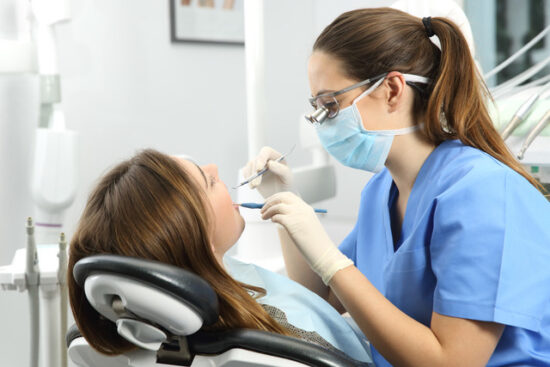
The first encounter we ever have with a dentist is when we attend an appointment for a checkup and a subsequent cleaning when we are little. From that point on, our life-long oral health journey begins.
As we grow older, we adapt to take care of our bodies and their needs, but one thing that will always remain necessary is these frequent cleanings. They are, after all, one of the best things we can do to help keep our smiles healthy and bright.
If you’re looking to schedule your next visit, we invite you to come into our neighborhood dental office. Our dentist in Millwoods is here to help you preserve your oral and overall health.
Dental Cleanings: Facts You Should Know
We know that dental cleanings are important, but what a lot of us don’t know are the various steps involved in this particular treatment and why each of them is done.
Removing harmful bacteria, plaque, and tartar is the main purpose of this service. As a result, it promotes fresh breath and prevents cavities, gingivitis, and infections from arising. A few other things about hygiene appointments you should be aware of include:
- It is a non-surgical process. No needles or anesthesia is needed but they are provided if requested by anxious patients or patients with sensitive teeth.
- It can be completed in about an hour, though those requiring major cleaning of plaque and/or root planning may need longer.
- It’s recommended that you have your teeth cleaned at least twice a year.
- X-rays and fluoride application are included in the cleaning.
- Typically, dental hygienists are the ones who perform the cleaning; your dentist sees you after if recare dental exam is scheduled or if the hygienist alerts the dentist of any issues or new developments with respect to your oral health.
- It’s safe and effective for patients of all ages.
What’s Involved
So you feel comfortable and familiar the next time you attend a dental cleaning near you, we’ve broken down the steps involved:
The Exam
- You’ll be greeted by your dental assistantor hygienist and shown to a chair. Once you’re comfortable, they ask you some questions about your dental/medical history, at-home cleaning habits, and whether you’re experiencing any issues.
- Next, the hygienist will manually assess your smile with a small round mirror.
- If needed, you’ll have dental x-rays taken, allowing your team to see how things are faring below the gum, specifically with your tooth roots and bones.
- The hygienist will also do an oral cancer screening, closely examining the mouth, throat, and neck for signs of pathologic changes, looking for signs including red patches and sores, leukoplakia (hardened white or gray lesions), and lumps.
The entire dental evaluation usually only takes a few minutes.
The Cleaning
- Scaling – First up is getting rid of any buildups of debris on the surface of your teeth, in between your teeth, and along your gum line. This is when you feel a slight scraping against your smile.
- Professional deep cleaning and polishing–Using a unique toothpaste known as prophylaxis paste, the hygienist will use a powerful electric toothbrush to remove any residual tartar.
- Flossing – To ensure that all debris is cleared away, especially in those harder-to-reach places, your smile is thoroughly flossed. If your gums bleed a bit while this is happening it’s okay, but it may be a sign that you need to floss more regularly. Afterward, you’ll be able to rinse your mouth out.
- Fluoride treatment – Fluoride gel or foam is derived from a naturallyoccurring mineral in the earth. It’s a great measure as it helps stop cavities from forming. Depending on the form, you’ll be asked to swish or sit with the fluoride on your smile for 1 minute.
And there you are! All finished! If you are due for recare, your dentist will see you after your dental hygiene treatment and check the status of your oral health, checking for cavities and other issues. If needed, before you leave the clinic, they will assist you in booking your dental treatment and a follow-up hygiene appointment 6 months later or earlier if recommended.
If you have any questions about dental checkups or cleanings or any concerns you want to express, don’t hesitate to speak up. Your comfort is important too!
Types of Dental Cleanings
Did you know that, depending on a patient’s needs and the current state of their oral hygiene, there are a few different forms of cleanings they can receive? They are as follows:
-
Prophylaxis Cleaning
This is simply a fancier name for a routine dental cleaning. Prophylaxis cleanings are the ones that the majority of patients receive when they need a dental cleaning in Millwoods.
-
Deep Cleaning
A deep cleaning is also referred to as scaling and root planing. This type of cleaning is administered to patients who are dealing with various stages of gum disease. Just like during ordinary cleanings, scaling is done to get rid of the buildup of plaque and calculus (hardened tartar). Root planing is done to soothe bleeding or swollen gums and to encourage receding gums to reattach to the tooth to prevent tooth loss.
-
Gross Debridement
This measure is mainly done for patients who haven’t visited the dentist in a while. It entails cleaning hardened collections of plaque from a patient’s smile.
Visit Agape Dental Clinic Today
Are you reading to schedule your next dental appointment? Our dentist near you eagerly awaits your visit and looks forward to working with you to preserve and maintain optimal oral health. Please call or email our staff to get started!

